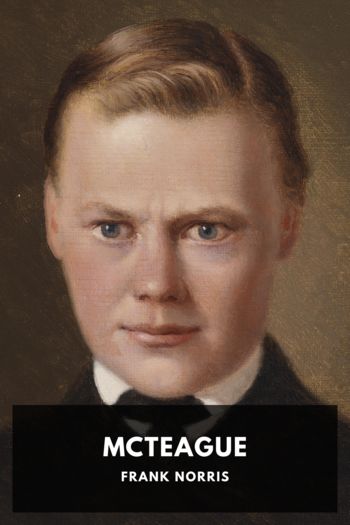McTeague - Frank Norris (great reads TXT) 📗

- Author: Frank Norris
Book online «McTeague - Frank Norris (great reads TXT) 📗». Author Frank Norris
“Huh? What, what?” stammered the dentist, taken all aback by her outburst.
“I say that you will find that money, that thirty-five dollars, yourself.”
“Why—why—”
“It’s your stupidity got us into this fix, and you’ll be the one that’ll suffer by it.”
“I can’t do it, I won’t do it. We’ll—we’ll share and share alike. Why, you said—you told me you’d take the house if the water was free.”
“I never did. I never did. How can you stand there and say such a thing?”
“You did tell me that,” vociferated McTeague, beginning to get angry in his turn.
“Mac, I didn’t, and you know it. And what’s more, I won’t pay a nickel. Mr. Heise pays his bill next week, it’s forty-three dollars, and you can just pay the thirty-five out of that.”
“Why, you got a whole hundred dollars saved up in your match-safe,” shouted the dentist, throwing out an arm with an awkward gesture. “You pay half and I’ll pay half, that’s only fair.”
“No, no, no,” exclaimed Trina. “It’s not a hundred dollars. You won’t touch it; you won’t touch my money, I tell you.”
“Ah, how does it happen to be yours, I’d like to know?”
“It’s mine! It’s mine! It’s mine!” cried Trina, her face scarlet, her teeth clicking like the snap of a closing purse.
“It ain’t any more yours than it is mine.”
“Every penny of it is mine.”
“Ah, what a fine fix you’d get me into,” growled the dentist. “I’ve signed the paper with the owner; that’s business, you know, that’s business, you know; and now you go back on me. Suppose we’d taken the house, we’d ’a’ shared the rent, wouldn’t we, just as we do here?”
Trina shrugged her shoulders with a great affectation of indifference and began chopping the onions again.
“You settle it with the owner,” she said. “It’s your affair; you’ve got the money.” She pretended to assume a certain calmness as though the matter was something that no longer affected her. Her manner exasperated McTeague all the more.
“No, I won’t; no, I won’t; I won’t either,” he shouted. “I’ll pay my half and he can come to you for the other half.” Trina put a hand over her ear to shut out his clamor.
“Ah, don’t try and be smart,” cried McTeague. “Come, now, yes or no, will you pay your half?”
“You heard what I said.”
“Will you pay it?”
“No.”
“Miser!” shouted McTeague. “Miser! you’re worse than old Zerkow. All right, all right, keep your money. I’ll pay the whole thirty-five. I’d rather lose it than be such a miser as you.”
“Haven’t you got anything to do,” returned Trina, “instead of staying here and abusing me?”
“Well, then, for the last time, will you help me out?” Trina cut the heads of a fresh bunch of onions and gave no answer.
“Huh? will you?”
“I’d like to have my kitchen to myself, please,” she said in a mincing way, irritating to a last degree. The dentist stamped out of the room, banging the door behind him.
For nearly a week the breach between them remained unhealed. Trina only spoke to the dentist in monosyllables, while he, exasperated at her calmness and frigid reserve, sulked in his Dental Parlors, muttering terrible things beneath his mustache, or finding solace in his concertina, playing his six lugubrious airs over and over again, or swearing frightful oaths at his canary. When Heise paid his bill, McTeague, in a fury, sent the amount to the owner of the little house.
There was no formal reconciliation between the dentist and his little woman. Their relations readjusted themselves inevitably. By the end of the week they were as amicable as ever, but it was long before they spoke of the little house again. Nor did they ever revisit it of a Sunday afternoon. A month or so later the Ryers told them that the owner himself had moved in. The McTeagues never occupied that little house.
But Trina suffered a reaction after the quarrel. She began to be sorry she had refused to help her husband, sorry she had brought matters to such an issue. One afternoon as she was at work on the Noah’s ark animals, she surprised herself crying over the affair. She loved her “old bear” too much to do him an injustice, and perhaps, after all, she had been in the wrong. Then it occurred to her how pretty it would be to come up behind him unexpectedly, and slip the money, thirty-five dollars, into his hand, and pull his huge head down to her and kiss his bald spot as she used to do in the days before they were married.
Then she hesitated, pausing in her work, her knife dropping into her lap, a half-whittled figure between her fingers. If not thirty-five dollars, then at least fifteen or sixteen, her share of it. But a feeling of reluctance, a sudden revolt against this intended generosity, arose in her.
“No, no,” she said to herself. “I’ll give him ten dollars. I’ll tell him it’s all I can afford. It is all I can afford.”
She hastened to finish the figure of the animal she was then at work upon, putting in the ears and tail with a drop of glue, and tossing it into the basket at her side. Then she rose and went into the bedroom and opened her trunk, taking the key from under a corner of the carpet where she kept it hid.
At the very bottom of her trunk, under her bridal dress, she kept her savings. It was all in change—half dollars and dollars for





Comments (0)